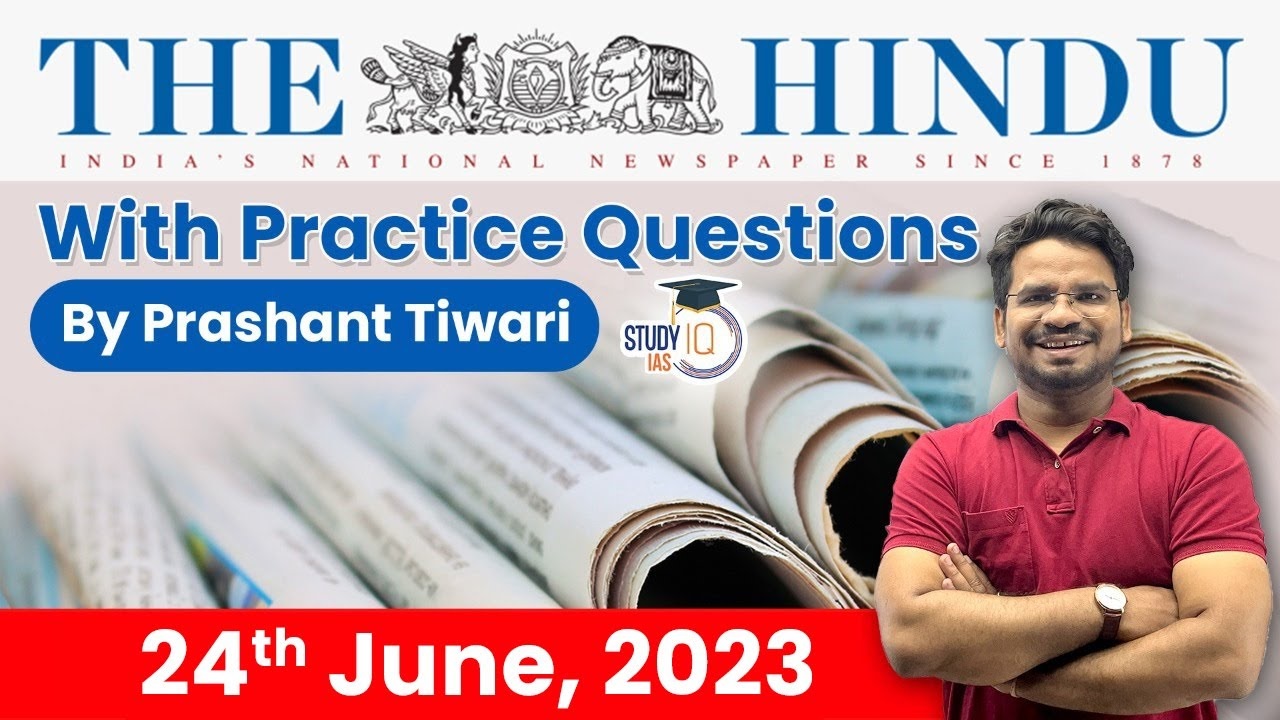The Hindu Newspaper Analysis for UPSC

The Hindu Newspaper Analysis 23 June 2023

- Addressing a joint session of the U.S. Congress, PM stressed on the shared value of democracy; he also touched on global concerns such as the war in Ukraine and the Indo-Pacific situation
- He talked about the digitisation of the Indian economy and said that India would soon be the third-largest economy in the world. “When India grows, the world grows,” the Prime Minister said.
- India-U.S. agreed to establish Defence Acceleration Ecosystem (INDUS-X), a new initiative to advance cutting-edge technology cooperation.
- These are the Logistics Exchange Memorandum of Agreement (LEMOA, 2016); Communications Compatibility and Security Agreement (COMCASA, 2018); and Basic Exchange and Cooperation Agreement (BECA, 2020).
- LEMOA allows the two militaries to access supplies, spare parts, and services at each other’s bases. COMCASA allows the US to provide India with its encrypted communications equipment and systems so that Indian and US military commanders, aircraft and ships can communicate with each other through secure networks in peace and war. And BECA allowed India to use US geospatial intelligence and enhance accuracy of automated systems and weapons like missiles and armed drones.
- General Security of Military Information Agreement (GSOMIA) – It was signed in 2002, to facilitate sharing military intelligence between India and the USA.
Way Forward
- The partnership between the two countries is critical for ensuring a free, open, and rules-bound Indo-Pacific region.
- The unparalleled Demographic Dividend provides enormous opportunities for the US and Indian firms for technology transfer, manufacturing, trade and investment.
- India is emerging as a leading player in an international system that is undergoing an unprecedented transformation. It shall use its present situation to explore opportunities to further its vital interests.

- The question of personal laws is basically the question of personal and religious autonomy versus the state’s authority to reform familial relations.
- Indian Constitution’s commitment to cultural accommodation is visible through a near-absolute fundamental right in Article 29(1) dedicated exclusively to conserving the distinctive culture of all citizens.
- Unity more than uniformity
- What is Uniform Civil Code?
- A UCC would provide for one law for the entire country, applicable to all religious communities, in their personal matters such as marriage, divorce, inheritance, adoption etc.
- Article 44 of the Constitution lays down that the state shall endeavour to secure a UCC for citizens throughout the territory of India.
- Article 44 is among the Directive Principles of State Policy. Directive Principles are not enforceable by court, but are supposed to inform and guide governance.
- Why is there no uniform code for personal law?
- Article 25 lays down an individual’s fundamental right to religion;
- Article 26(b) upholds the right of each religious denomination or any section thereof to “manage its own affairs in matters of religion”;
- Article 29 defines the right to conserve distinctive culture.
- An individual’s freedom of religion under Article 25 is subject to “public order, health, morality”.

- India-Egypt ties are perhaps the oldest civilisational link. In 2750 BCE, the Pharaoh Sahure sent ships to the “Land of Punt”, which historians identify with peninsular India. By the middle of the second millennium BCE, Egyptian mummies were wrapped in muslin dyed with indigo, both from India.
- India’s trade with the most populous Arab country stood at $6,061 million in 2022-23, having declined by 17% over the previous year.
- Egypt’s largest imports are refined petroleum, wheat (world’s largest importer), cars, corn and pharmaceuticals — all of which India has the potential to supply.

- India has climbed eight places from last year in the annual Gender Gap Report, 2023, and is now ranked 127 out of 146 countries in terms of gender parity.
- The four key markers of the index — economic participation and opportunity; educational attainment; health and survival; political empowerment.
- India has fared well in education, and in political empowerment, with representation of women of over 40% in local governance, thanks to efforts on the ground after the 73rd and 74th Amendments.
- But, as the report points out, women represent only 15.1% of parliamentarians, “the highest for India since the inaugural 2006 edition”.
- To understand where things stand on women’s participation in politics, consider this: Nagaland, which became a State in 1963, elected its first two women MLAs only in 2023.
- On providing even access for men and women on economic participation and opportunity, India ranks near the bottom, with less than 40% parity.
- The pandemic may have stalled progress to achieve gender equality by 2030, but work towards bridging the gap must go on in earnest.

- NATO on Friday concluded its largest ever air force deployment exercise in Europe in a show of force against potential threats such as Russia.
- The German-led “Air Defender 23” manoeuvres brought together some 250 military aircraft from 25 NATO and partner nations like Japan and Sweden


 The Hindu Newspaper Analysis 6 October 2...
The Hindu Newspaper Analysis 6 October 2...
 The Hindu Newspaper Analysis 5 October 2...
The Hindu Newspaper Analysis 5 October 2...
 The Hindu Newspaper Analysis 4 October 2...
The Hindu Newspaper Analysis 4 October 2...





















